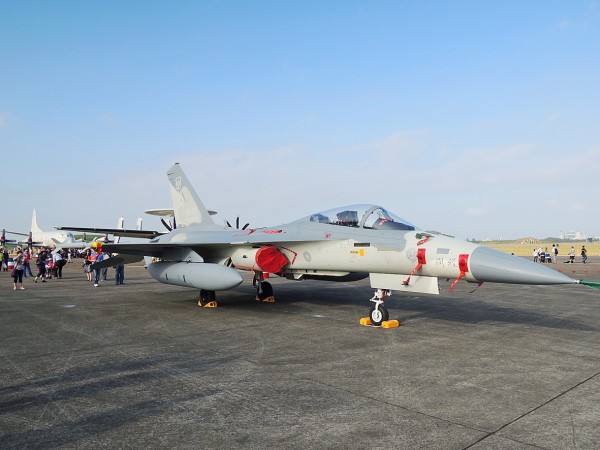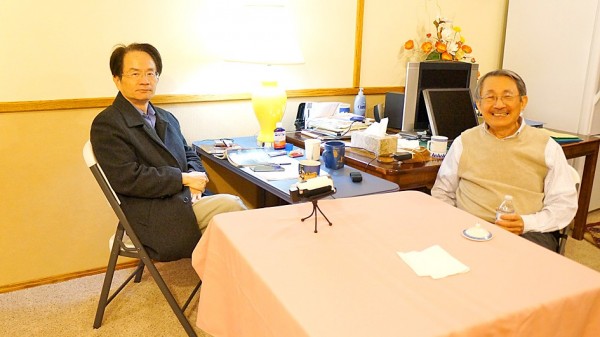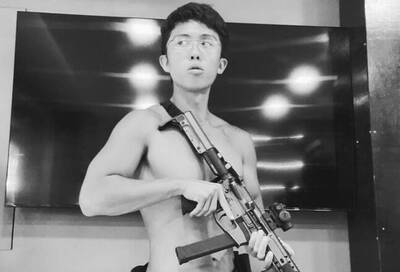《TAIPEI TIMES 焦點》 Defector reveals mini-nuke project against China

An Indigenous Defense Fighter is pictured at a military base in an undated photograph. Photo: Lo Tien-pin, Taipei Times
By Lo Tien-pin and Jake Chung / Staff reporter, with staff writer
Taiwan had plans to load miniaturized nuclear weapons into auxiliary fuel tanks of Indigenous Defense Fighter (IDF) jets to attack China, said Chang Hsien-yi (張憲義), who was the deputy director of the First Institute of the Chungshan Institute of Science and Technology (CSIST) and who defected to the US in 1988.
Due to the growing military threat from China, Taiwan during the 1980s conducted numerous military projects, including the research and development of mid-range surface-to-surface ballistic missiles, a nuclear weapons research project and the IDF project, Chang was quoted as saying in a new book that was based on an interview by Academia Sinica associate research fellow Chen Yi-shen (陳儀深), who last year went to the US to interview Chang.
Chang, a former colonel, said that the CSIST planned to use the IDF as a bomber because it was developed by Taiwan and its range could be fine-tuned without consulting other nations.
“We wanted to extend the IDF’s range to 1,000km, as it would also extend the effective range of the nuclear weapon,” Chang was quoted as saying.
The plan was for a pilot — unmarried with no family and not having been told that they would be carrying a nuclear weapon — to fly the aircraft, Chang said.
With a nuclear weapon in the auxiliary fuel tank, the fighter jet would have a range of 800km, Chang said, adding that the pilot would only be told that they would be going on a mission from which they would probably not return.
However, Chang said that the plan put ongoing US support at risk, adding that it was because of Taiwan’s ambitions that the US decided to “put the cards on the table.”
It was also because of this project that the US in 1988 forced Taiwan to shut down all facilities related to the development of nuclear weapons, as well as shuttering a heavy water reactor at the CSIST, Chang said.
When asked about his relationship with the US and the CIA, Chang said he was contacted by the CIA in 1982 and the agency established a task force on Taiwan and nuclear arms after he passed a polygraph test, adding that he would meet with CIA personnel every two or three months near Shilin (士林) night market in Taipei, mostly discussing what the government was purchasing for its nuclear weapons research, or the contents of CSIST or government meetings.
The CIA arranged his exit from Taiwan in 1988 by having a company registered in the US issue him a work visa and a new passport, providing a cover for him to fly from Kaohsiung to Seattle via Hong Kong, Chang said, adding that his wife transferred flights in Japan and met with him in the US.
Democratic Progressive Party Legislator Lo Chih-cheng (羅致政) yesterday said the decision to develop a nuclear deterrent had spanned military strategy, politics and diplomacy.
The US’ intervention was anticipated and reflective of the US as a hegemonic power, Lo said, but added that the US’ move was inexorably tied to Chang’s defection.
Putting aside the question of a soldier’s loyalty to his nation, and the moral question of developing nuclear weapons, Chang — while having been shielded from the Taiwanese judiciary — will have to answer to history for his actions, Lo said.
Meanwhile, a senior Ministry of National Defense official yesterday said that the nation’s policy regarding nuclear weapons is that “we do not manufacture, own or use nuclear weapons,” adding that since Taiwan does not have nuclear weapons, the possibility of attacking China with nuclear weapons does not exist.
新聞來源:TAIPEI TIMES

Chang Hsien-yi, right, talks to Academia Sinica researcher Chen Yi-shen during an interview in the US in an undated photograph. Photo provided by Walkers Cultural Publisher
















